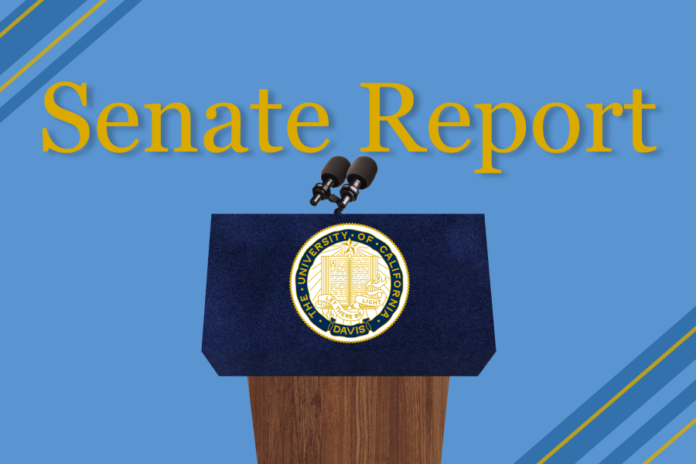ASUCD Senate hosted their quarterly town hall meeting and passed SB#11, creating a rally pack committee at UC Davis
By JORDAN POLTORAK — campus@theaggie.org
The quarterly ASUCD town hall began in the Coffee House (CoHo) around 6:10 p.m. after the reading of the UC Davis Land Acknowledgement. Former Senator Chasa Monica, a fourth-year molecular and medical microbiology and philosophy double major, asked the first question.
“Is there any way to reform town halls and find a better way to connect with the student population?” Monica said.
Multiple senators suggested engaging Registered Student Organizations (RSOs) to attend or send representatives.
Alexander Jackson, a third-year chemistry major, asked about how the UC Davis community is impacted by the results of the election.
“How do we as a community stay committed to our shared principles, and how do we move forward and continue to recommit ourselves to change at the local level?” Jackson said.
The senators then provided reassurance that they will be part of positive change within the UC Davis community. Senator Amrita Julka expanded on the senate’s plans to support students.
“It’s hard not to lose hope, but what we can do is things to help students,” Julka said. “Specifically with the Student Health and Wellness [SHAW] unit, they will be talking with different resource centers on campus such as the LGBTQIA+ [Resource] Center, Women’s Resource[s] [and Research] Center, Cross Cultural […] Center and gauge how they will be affected [while] offer[ing] mental health resources.”
External Affairs Vice President (EAVP) Zeph Schendlebach addressed concerns regarding how the president-elect would affect the UC system.
“The UC Office of the President [UCOP] is already looking into alternative sources of funding for the UC system,” Schendlebach said. “The UCOP is already looking for grants and long-term funding sources to receive supplemental scholarship funding for students, especially for students that qualify for the Cal Grant and the Pell Grant.”
To spark more student participation in the town hall, ASUCD President Gaius Ilupeju walked around to various students in the CoHo and asked them what mattered most to them. The answers ranged from costs to efforts toward basic needs to freedom of protest and feeling like their voice is heard politically.
After the town hall, the senators moved to the Mee Room of the Memorial Union for their weekly senate meeting.
The senators proceeded to confirm a new Housing and Transportation Advocacy Committee (HTAC) Member, Sexual Assault Awareness Advocacy Committee (SAAAC) Vice Chair, two SAAAC Committee Members, the STEM Committee Vice Chair and three Gender and Sexuality Committee (GASC) Commissioners.
Justin Hurst, the ASUCD President during the 2019 to 2020 school year, presented on behalf of the ASUCD Alumni Network.
Hurst explained their mission statement for their current board.
“Our goal is to foster a real sense of community amongst the alumni of ASUCD to help translate the skills and experiences gained through our ASUCD experiences into future growth, both personal and professional.”
The senate then moved into quarterly reports from various units, the first being the Entertainment Council.
The Unit Director, Johnny Ng, and the Assistant Unit Director, Binh Do, recapped the success of Sunset Fest with 8,000 to 9,000 people in attendance, more money raised in sponsorships than the last five years combined and the first time the event was held at UC Davis Health Stadium since 2021.
SB#12 was then introduced in order to gauge the support of the table. The bill proposes taking $25,000 in order to sponsor a “Pop Up” concert with Mike Sherm. Students would pay $5 for concert entry, with their ticket funds being donated to The Pantry.
Internal Affairs Commissioner Amanda Clark expressed concern about revenue.
“There are unexpected events that make units need more money,” Clark said. “We just went to town hall and listened to how students are concerned about everything that has happened. There are other external factors that go into addressing concerns of the student body.”
Unit Director Ng responded.
“To students who don’t know what ASUCD is and what we do, this is an opportunity to give money to a good cause,” Ng said. “In doing so, we can give you something you might have never experienced, and an artist.”
The California Aggie then moved into their quarterly report presented by Editor-in-Chief Chris Ponce. He informed the senate of “The Aggie Angle” podcast and the launch of The Aggie’s social media account on TikTok.
Ponce also responded to Julka’s concerns on student privacy.
“The Society of Professional Journalist guidelines require us to use our best judgment to minimize harm,” Ponce said. “This is a priority to us. We want to see the safety of students but we also want to see transparency when we report.”
Multiple senators also expressed concerns about being misquoted by The Aggie.
“Journalism is a case-by-case basis,” Ponce said. “We do keep an eye on this, and the quality of our journalism matters to us.”
The Student Advocate Office gave their report and informed the senate that since spring 2023, about half of all of their cases have come from Artificial Intelligence (AI) plagiarism.
Next, the various members of the table encouraged the Innovation and Research Lab to promote ASUCD more in regards to their branding and events.
After reports, SB#11 was passed unanimously. The bill creates a rally pack committee that would organize events to promote athletics and ASUCD while featuring the marching band and dance team.
The meeting was adjourned at 11:45 p.m.
Written by: Jordan Poltorak — campus@theaggie.org










